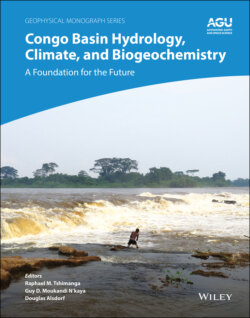Читать книгу Congo Basin Hydrology, Climate, and Biogeochemistry - Группа авторов - Страница 68
ABSTRACT
ОглавлениеUnderstanding the impacts of climate on surface water hydrology is required to predict consequences and implications on freshwater habitats, ecological assets, and wetland functions. Although the Congo basin is considered a freshwater‐rich region, largely characterized by numerous water resources after the similitude of the Amazon basin, recent accounts of droughts in the basin are indications that even the most humid regions of the world can be affected by droughts and its impacts. Given the scarcity and limited availability of hydrological data in the region, GRACE (Gravity Recovery and Climate Experiment) observations are combined with model and SPEI (standardized precipitation evapotranspiration index) data to investigate the likelihood of such impacts on the Congo Basin’s surface water hydrology. By integrating multivariate analysis with support vector machine regression (SVMR), this study provides some highlights on the characteristics (intensity and variability) of drought events and GRACE‐derived terrestrial water storage (TWS) and the influence of global climate on the Congo river discharge. The southern section of the basin shows considerable variability in the spatial and temporal patterns of SPEI and extreme droughts over the Congo Basin appear to have persisted with more than 40% coverage in 1994. However, there has been a considerable fall in drought intensities since 2007 and this coincides with periods of strong positive anomalies in discharge (i.e., 2007‐010). GRACE‐derived TWS over the Congo basin is driven by annual fluctuations in rainfall (r = 0.81 at three months phase lag) and strong interannual variations of river discharge (r = 0.88, α= 0.05). Generally, results show that changes in the surface water variations (from gauge and model output) of the Congo basin is a key component of the GRACE water column. The outputs of the SVMR scheme indicate that global climate through sea surface temperature anomalies of the Atlantic (r = 0.79, α= 0.05), Pacific (r = 0.79, α= 0.05), and Indian (r = 0.74, α= 0.05) oceans are associated with fluctuations in the Congo river discharge, and confirm the importance of climatic influence on surface water hydrology in the Congo basin.
